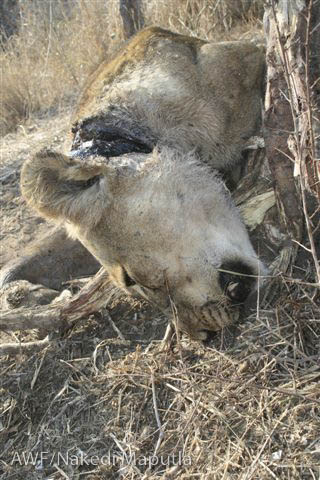Lion Killed by Snare
In the last blog I spoke about animals crossing the border in to Mozambique. Sometimes they don’t come back!
On Friday October 24th I went in to Mozambique together with Francois and Erin and ended up on the border with the Kruger National Park. About 80 metres from the fence we spotted a lioness that lay motionless against a tree trunk. She didn’t look like she was alive, so we cautiously walked towards her.
Upon arrival we saw that she was dead and had a big wound around her neck.
The deep wound was caused by a wire that was still tied to a tree trunk on the game path. Judging by the wound it looked like the animal died in the morning hours. The tree on which the snare was attached had been heavily attacked showing that the poor animal tried, albeit in vain to free herself from this wire that kept sinking deeper and deeper in to her neck with each attempt.
 A lion killed by a wire snare.
A lion killed by a wire snare.
That’s the thing about the snares; the more you struggle the deeper the wire sinks in to the flesh; I don’t think animals know that.
This snare must have been set to catch animals like antelopes. But sometimes the snares catch non-target animals like this lioness.
We later searched the area for more snares and found ten of them in an area of about 50 square metres.
On the other hand, people need to eat. How do you tell a man without any sort of income to stop hunting? What options do you give him to feed his family? The method of hunting stated above is extremely crude, but it is also very cheap.
I’m posing these questions so that you the reader will hopefully empathise with both humans and wildlife in certain parts of the world. What do you think?
As long as we have people and organisations like AWF there is always hope for our quest that together with people, the wildlife and wild lands of Africa will endure forever. In the next few weeks I hope to write a success story regarding the above mentioned.
It’s not all doom and gloom!